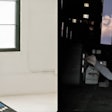The grisly murder of six-year-old Adam Walsh in 1981 was a wake-up call for America. Not only did it bring national attention to the growing problem of missing and abducted children, it also fostered an overhaul in the system. The Child Protection and Safety Act was signed into law and the National Sex Offender Registry was created, offering new tools for law enforcement.
Three years later Adam's case also inspired Special Agent Terry Thomas, now State Coordinator of the Crimes Against Children (CAC) program, based in Tallahassee, Fla., to start an innovative unit.
"I had been involved in helping design and build interview rooms for kids in buildings," says Thomas, a 33-year veteran in law enforcement. "But it wasn't until I got here that I thought we should get a vehicle and actually take it to the kids."
Coincidentally, a Fleetwood sleeper trailer had just been seized from a drug dealer and it was perfect for Thomas' needs. The Federal Department of Law Enforcement gutted the trailer and furnished it with specialized equipment, then obtained a truck and a portable generator for free. The result was a completely self-contained mobile unit.
Funding for the program was as unique as the unit itself. The Florida legislature passed a bill creating a CAC Criminal Profiling Trust Fund. This fund put a 10-dollar surcharge on all birth certificates, to be used to help maintain the CAC databases and provide investigative and technical assistance for local agencies as well as multi-disciplinary training on CAC issues.
With everything in place, Thomas and his Crimes Against Children Mobile Unit team were ready to hit the road. But there were still plenty of naysayers.
"Initially there were a lot of people who thought the trailer might be unfamiliar territory to the kids and therefore traumatic for them," he says.
Instead, the unit became a hit; now, as then, children are intrigued by the unique surroundings. They're allowed to explore the mobile unit before the interview begins, which helps them feel more comfortable. And, even though the inside of the trailer is designed to be relatively neutral, the main room is equipped with child-sized bean bag chairs and plenty of teddy bears and other toys.
There are also many strategically placed hidden cameras and microphones. Agents in the back of the trailer are able to monitor all of the cameras while agents in the front watch the interview itself and communicate with the interviewer via wireless headphone.
This high-tech, onsite approach achieves several things. It eases the fear that many victims feel when faced with (sometimes repeated) questioning; provides quality evidence for prosecutors; and, most importantly, is perfect for multiple victim, offender, or jurisdiction situations, cases that would overwhelm a traditional brick-and-mortar CAC.
For example, one such ongoing case involves an assistant principal suspected of molesting his autistic students. The Mobile Unit officers were able to handle the daunting task of interviewing all 68 students, along with their parents and the entire staff. They were also able to deal with the other sensitive circumstances of the case.
"We needed specialists that could help work with autistic kids," says Thomas, "and we wanted to avoid publicity. We have purposely kept the outside of the vehicle plain, with no police markings, so that the press and others are not aware of what we're doing."
The operation worked well. Even though the case has not gone to trial, the assistant principal has been arrested, thanks to the Mobile Unit's team of investigators.
Another situation in which discretion was extremely important was when an elected state official was accused of molesting several children in a Florida county. The Mobile Unit was brought in, but soon realized that they couldn't use local agents.
"We couldn't involve anyone in that county," says Thomas, "because, as a state official, he touched the lives of everyone in law enforcement. "So we parked the trailer in a mall parking lot and none of the agencies in the area even knew we were there. We were able to bring witnesses and kids to that location in private, without attracting a crowd."
The state official case was a bit unusual, since running the Mobile Unit almost always depends on an intricate framework of special agents, including the Crimes Against Children Rapid Response Team, also based in Tallahassee.
"We have agents assigned to all sections of Florida," Thomas says, "so if a case breaks in another region the agent can call me. We'll then get together with our Rapid Response Team and decide who and what we need. We strategize and pull together a team using local resources as well as our own agents."
The team has even put together a roll call video that stresses the trailer's efficacy and its benefits to other agencies, especially when large cases are involved. The tape has been widely distributed to law enforcement in Florida, so that all agencies know how to access the services of the Mobile Unit.
This multi-disciplinary approach expedites the entire process of each case, and is cost effective, especially for small agencies whose resources tend to be limited. And the specialized education each agent assigned to the program receives-a minimum 80 hours of training in interviewing for crimes against children-ensures every case will be handled in a professional, yet child-friendly manner.
This was the case when 10-year-old Jessica Rodriguez was abducted from a bus stop in Gilchrest County with only her two younger sisters as witnesses. Days passed without a lead but, remarkably, the little girl was dropped off at a Wal-Mart store three-and-a-half days after she had been abducted. Thomas' unit then went into action, interviewing the little girl extensively.
"She gave a very, very detailed description of her abductor," he says, "so much so that we were able to bring in a police artist who did a drawing of the guy. The likeness was so uncanny that the perpetrator's own sister recognized him and turned him in."
Thomas and his team then began interviewing the perpetrator's three daughters, who had been in the house while Jessica had been chained to a wall in a "mother-in-law" style bedroom at the opposite end of the house.
The evidence gathered by both the Mobile Unit and the local agencies was so good that the team was able to put the bad guy-James Paul Johnson-away for 65 years.
But Thomas, who coordinates all of the cases for the Mobile Unit, stresses that he is not the only one responsible for the success of bringing perpetrators to justice.
"There are a lot of people working every angle of the case," he notes, "and it takes a team to carry out each and every one of the cases that we take on."
Kelly Kyrik is a freelance writer who lives in Colorado. She is a frequent contributor to POLICE.











